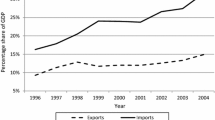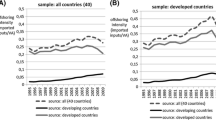Abstract
How International Outsourcing Drives Up Eastern European Wages. — This paper analyzes the effects of intermediate goods trade on the development of real wages in Central and Eastern European manufacturing. The empirical findings show that world exports in intermediate goods of the CEEC exhibit a negative impact on wages, and imports a positive one. Since 1993, intermediate goods trade between the EU and the CEEC accounted for an increase in wages being most pronounced in Slovakia, Poland and the Czech Republic.
Similar content being viewed by others
References
Abraham, F., and J. Konings (1999). Does the Opening of Central and Eastern Europe Threaten Employment in the West?World Economy 22 (4): 585–601.
Arndt, S. W. (1997a). Globalization and the Open Economy. North AmericanJournal of Economics and Finance 8(1): 70–79.
Arndt, S. W. (1997b). Super-Specialization and the Gains from Trade. The Lowe Institute of Political Economy, Claremont McKenna College, mimeo.
Arndt, S. W. (1999) Globalization and Economic Development.The Journal of International Trade and Economic Development 8 (3): 309–318.
Baltagi, B. H. (1995).Econometric Analysis of Panel Data. Chichester: Wiley.
Baltagi, B., and S. Khanti-Akom (1990). On Efficient Estimation with Panel Data: An Empirical Comparison of Instrumental Variables Estimators.Journal of Applied Econometrics 5 (4): 401–406.
Bowden, R. J., and D. A. Turkington (1984).Instrumental Variables. Cambridge, Mass.: Cambridge University Press.
Davidson, R., and J. G. MacKinnon (1993).Estimation and Inference in Econometrics. Oxford: Oxford University Press.
Deardorff, A. V. (1998). Fragmentation in Simple Trade Models. Working Paper 422. Department of Economics, University of Michigan.
Deardorff, A. V. (2001). Fragmentation across Cones. In S. W. Arndt and H. Kierzkowski (ed.),Fragmentation: New Production Patterns in the World Economy. Oxford: Oxford University Press.
Egger H., and P. Egger (2000). Outsourcing and Skill-Specific Employment in a Small Economy: Austria and the Fall of the Iron Curtain. Discussion Paper 0024. Volkswirtschaftliche FakulÄt, University of Linz.
Egger H., and P. Egger (2001) Cross Border Outsourcing: A General Equilibrium Perspective and Evidence for Outward Processing in EU Manufacturing. WIFO Working Paper 139. Austrian Institute of Economic Research. Vienna.
Egger, H., and J. Falkinger (2001). A Complete Characterization of the Distributional Effects of International Outsourcing in the Heckscher-Ohlin Model. Munich University, CESIFO WPS 573.
Feenstra, R. (1998). Integration of Trade and Disintegration of Production in the Global Economy.Journal of Economic Perspectives 12 (4): 31–50.
Feenstra, R., and G. Hanson (1996a). Foreign Investment, Outsourcing, and Relative Wages. In R. Feenstra, G. M. Grossman, and D. A. Irwin (ed.),Political Economy of Trade Policy: Essays in Honor of Jagdish Bhagwati. Cambridge, Mass.: MIT Press.
Feenstra, R., and G. Hanson (1996b). Globalization, Outsourcing and Wage Inequality.American Economic Review 86 (2): 240–245.
Feenstra, R., and G. Hanson (1997). Foreign Direct Investment and Relative Wages: Evidence from Mexico’sMaquiladoras.Journal of International Economics 42 (3/4): 371–393.
Fontagné, L., M. Freudenberg, and D. ünal-Kesenci (1996).Statistical Analysis of EC Trade in Intermediate Products. Paris: EUROSTAT.
Jones, R. W., and H. Kierzkowski (1997). Globalization and the Consequences of International Fragmentation. In R. Dornbusch, G. Calvo and M. Obstfeld (ed.),The Festschrift in Honor of Robert A. Mundell. Cambridge: MIT Press, forthcoming.
Kohler, W. (2000). Fragmentation: A Theoretical Treatment. University of Linz, mimeo.
Kohler, W. (2001). A Specific-Factors View on Outsourcing.North American Journal of Economics and Finance 12 (1): 31–53.
Konings, J., and H. Vandenbussche (1995). The Effect of Foreign Competition on U.K. Employment and Wages: Evidence from Firm-Level Panel Data.Weltwirtschaftliches Archiv 131 (4): 655–672.
Myant, M., and S. Smith (1999). Czech Trade Unions in Comparative Perspective.European Journal of Industrial Relations 5 (3): 265–285.
Pollert, A. (1999). Trade Unionism in Transition in Central and Eastern Europe.European Journal of Industrial Relations 5 (2): 209–234.




